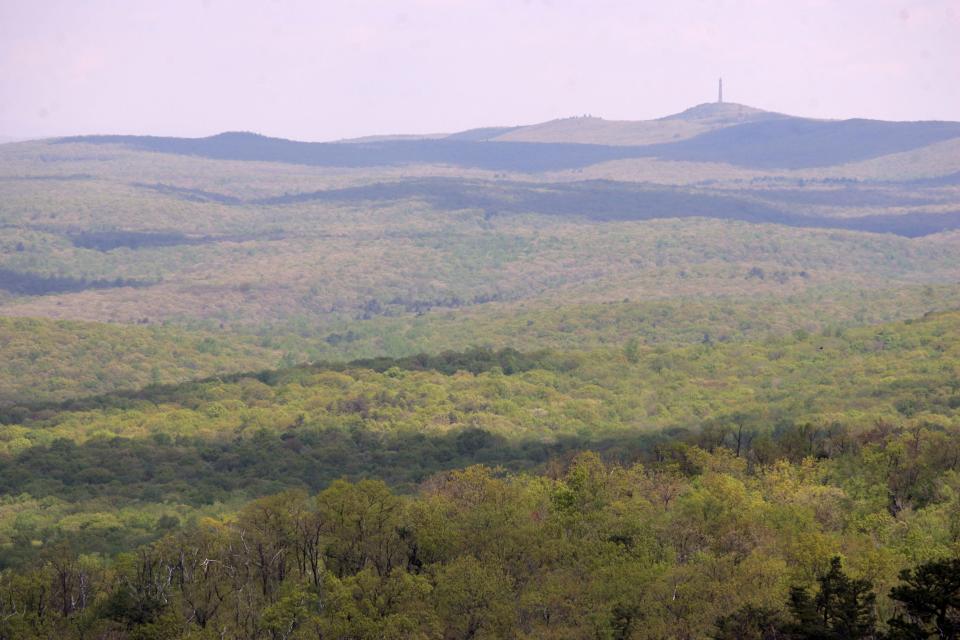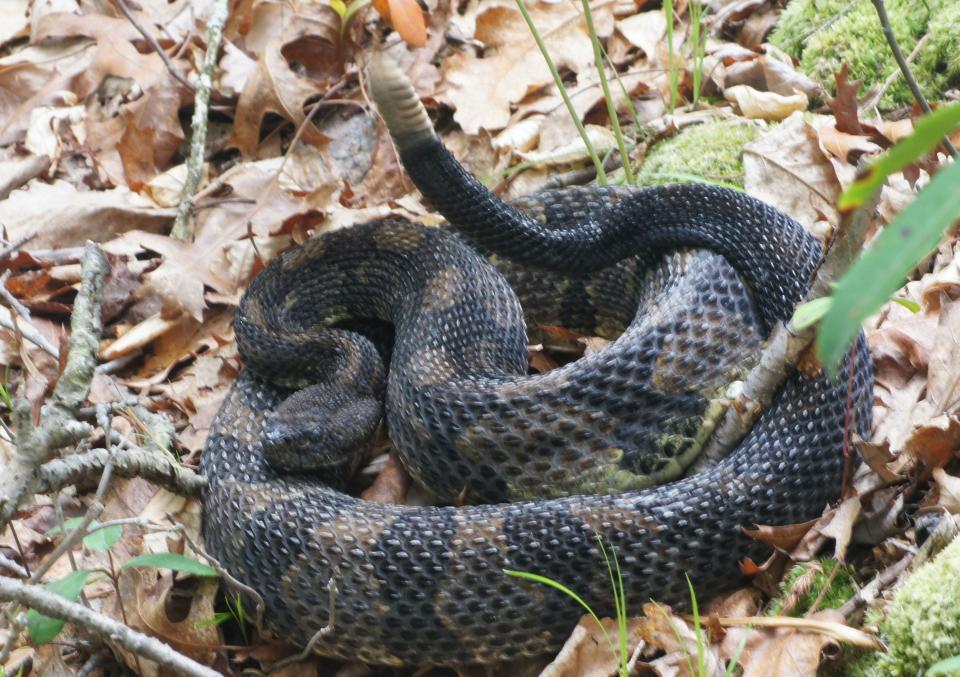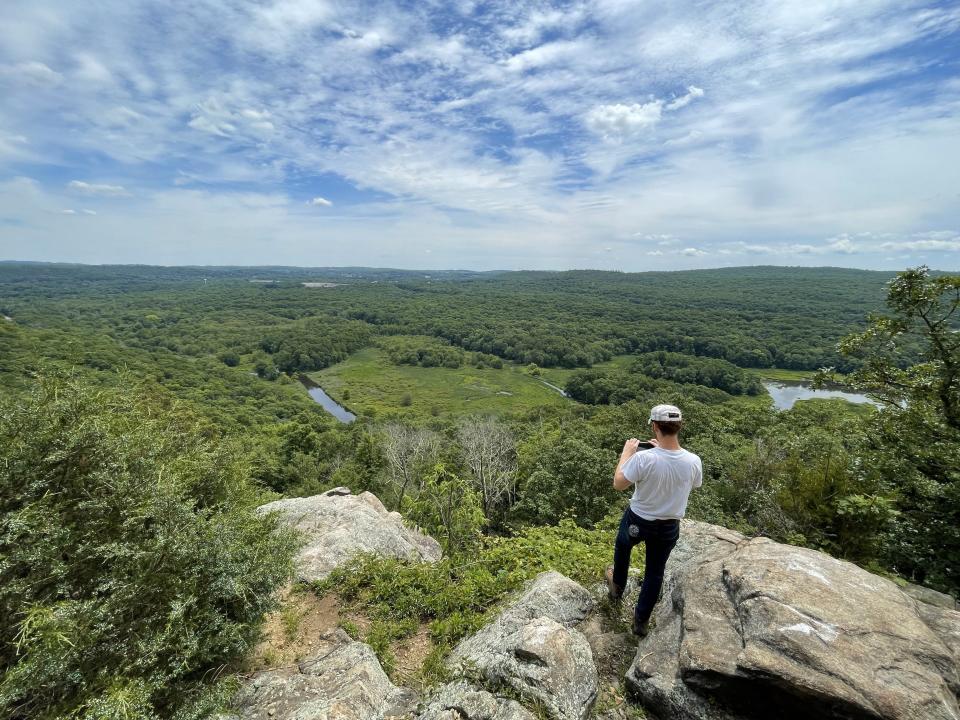Over the summer, thousands of visitors enjoy picturesque hiking in New Jersey’s 27 state parks and 11 state forests. These beautiful landscapes offer opportunities for a wide range of activities, from mountain biking and hiking to kayaking and bird watching. They are also home to a large variety of local wildlife — more than 400 species of land-dwelling vertebrate wildlife live in the Garden State, according to NJ Fish & Wildlife.
While hiking, it’s essential to be respectful of local wildlife — these trails meander through their homes — and to prepare for emergency situations. Although it’s unlikely that these situations could occur, it’s important to be prepared.
Extreme Heat
While hiking in hot weather, the American Hiking Society advises that people start early and avoid hiking from 11 a.m. to 3 p.m. During that time period, people should hike in shaded areas if possible. It's essential to use sunscreen, bring water and wear clothes suitable for hot weather.
Story continues below photo gallery
Hiking in extreme heat can cause heat exhaustion and heat stroke, although heat-related illnesses can also occur prior to the declaration of an "extreme heat" emergency, according to the New Jersey Department of Human Services. To treat heat exhaustion, the NJDHS recommends drinking water or other fluids and resting. The American Hiking Society also advises staying in the shade for about a half hour and dampening the body with cool water.
More: Here are North Jersey's best hikes for families, for great views or for a challenge
If not treated, heat exhaustion can progress into heat stroke, which can potentially be fatal and should be treated immediately by pouring water onto the affected person’s head and chest. You should also call 911 immediately for professional help. The American Hiking Society also recommends that the affected person should be partially submerged in cool water or moved to the shade.
Ticks
A variety of ticks can be found throughout North Jersey, most particularly in wooded areas during the spring and summer. Ticks can latch on to people and pets and transmit Lyme disease and Rocky Mountain Spotted Fever.
To prevent tick bites, NJ Fish & Wildlife recommends using tick repellents on clothing and exposed skin, as well as wearing light-colored long-sleeve shirts and long pants. After hiking, check to make sure you aren’t carrying any ticks.
To remove ticks, NJ Fish & Wildlife advises using fine-tipped tweezers and pulling the tick upwards out of the skin without twisting the tick.
More: It's time to head outside, New Jersey! These are the most visited state parks
Snakes
Although many snakes are found in North Jersey, most are not venomous. Only the eastern copperhead and timber rattlesnake pose a danger to hikers. Snakes rarely bite humans and will usually try to stay away from humans if they can. According to the NJDEP, there are no records of anyone dying from a venomous snake bite in NJ in the past 70 years, and only 15 bites from venomous snakes have occurred in the past 22 years.
The eastern copperhead is typically found from May through October in North Jersey forests. Their bites are rarely fatal, but are painful and should be treated immediately.
The timber rattlesnake, the only rattlesnake found in New Jersey, is one of the state’s most endangered species and continues to decline. These snakes are typically found between May and October in portions of northern New Jersey and the Pinelands.
Although there is a relatively small population of timber rattlesnakes in New Jersey, it’s possible to see them while hiking. A bite from this snake can be fatal if left untreated; you should receive medical care within 30 minutes of being bitten. However, this is extremely rare: according to the NJDEP, no deaths have occurred in the Garden State due to a timber rattlesnake bite, and there are no reported bites from this snake other than to people handling them.
To avoid a snake bite, NJ Fish & Wildlife recommends watching where you walk and maintaining a distance of at least five feet from a snake. It cautions against reaching blindly into nooks and crannies like vegetation or firewood. Do not try to trap or handle a snake, even if it is dead.
More: Sure, NJ is densely populated. But — surprise! — it also has 11 state forests to explore
If bitten by a venomous snake, call 911 immediately. Do not drive yourself to the hospital, do not take painkillers, and don't wait for the pain to subside before seeking help, the CDC writes. If possible, take a photograph of the snake to help with identification at the hospital. NJ Fish & Wildlife recommends asking hospital staff to contact NJ Poison Control for the most updated treatment protocols for venomous snake bites because of how exceedingly rare they are.
Non-venomous snake bites are usually harmless and should be cleaned and covered in the same way as a typical cut. Any snake teeth left in the bite should be removed, and the affected area should be watched for signs of infection. However, according to Johns Hopkins Medicine, “all snake bites should be treated as venomous until proven otherwise.” Receiving medical attention immediately in the event of any snake bite is crucial.
Bears
Black bears live throughout the Garden State and are crucial to maintaining a healthy ecosystem. Although it’s unlikely that you’ll see a bear while on a trail, an encounter is not impossible. When faced with a bear, NJ Fish & Wildlife recommends to not run away and not make direct eye contact. Back away slowly and speak calmly and assertively. Make yourself appear as large as possible by waving your arms or holding items above your head. If the bear attacks you, which is extremely rare, fight back using any items possible while aiming for the snout or eyes.
Bears will normally leave the area when they hear hikers approach. They are most likely to venture into specific areas like berry patches.
General safety tips
NJ Fish and Wildlife advises people to only hike during the daytime and to not veer off the marked trails. Stay on popular trails and bring both your cell phone and a whistle or other kind of noisemaker. Be sure to let family and friends know where you are planning to hike and what time you plan to be back.
You might consider downloading a hiking app on your cellphone such as AllTrails which provides maps and can show you where you are on a trail in real time. There's also a New Jersey State Parks app.
The NJ State Park Police advises staying away from areas that are unfamiliar or have poor visibility. Remain alert and aware of your surroundings and do not wear headphones or earbuds. If possible, it’s best to not hike alone. If you see something suspicious or need to report an emergency, call the State Park Police at 1-877-927-6337.
All environmental emergencies can be reported to 1-877-WARN-DEP. Trail guides for state parks can be found at https://www.nj.gov/dep/parksandforests/trailguides/, which include maps, trail descriptions, and safety information.
This article originally appeared on NorthJersey.com: New Jersey Hiking Tips: Dealing with bears, ticks, snakes


